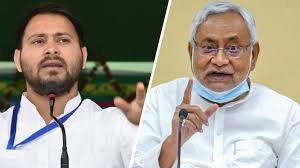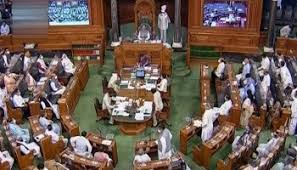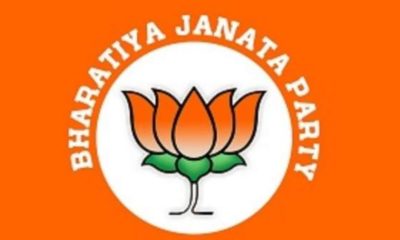Top News
BJP plays backward caste card to counter ‘Mandal’ politics

Patna: In a bid to counter the ‘Mandal’ politics of the grand alliance in the Bihar assembly polls, particularly Rashtriya Janata Dal (RJD) chief Lalu Prasad’s pitch for ‘backward versus upper caste fight’, the BJP is playing the backward castes card.
In order to woo the Dalits, Other Backward Castes (OBCs) and Extremely Backward Castes (EBCs), the Bharatiya Janata Party (BJP) has ruled out any ‘sawarna’ (upper caste) person becoming the chief minister if the BJP-led National Democratic Alliance won two-thirds majority in the state polls.
With ‘caste’ factor, re-entrenched by recommendations of reservations by the the Mandal Commission, again dominating the campaigning for Bihar polls, senior BJP leader and union minister Giriraj Singh said that the next Bihar chief minister would be either from the Dalits, OBCs or EBCs and not an upper caste.
“An upper caste cannot become the chief minister of Bihar; it is certain that if the BJP-led NDA comes to power, the next chief minister will be either from the OBCs or EBCs,” the union minister – who belongs to the powerful and landed Bhumihar upper caste with a strong presence in the state politics – told the media here.
The BJP leader played this ‘backward caste chief minister card’ two days after RJD chief Lalu Prasad said that the Bihar assembly polls were a fight between the backward and forward castes.
The BJP leader’s statement reflected the ground reality in Bihar and sent out a political message to OBCs and EBCs, who constitute around 50 percent of the voters in the state. He said the upper castes were only keen for the development of Bihar.
“Lalu Prasad and Nitish Kumar should not worry about the upper castes; they should play their caste politics to create divide and hatred in society,” Singh remarked.
Interestingly, going by the NDA list of candidates for the Bihar polls, it is clear that the party is essentially relying on the upper castes in the five-phased elections.
Of the 243 seats in the assembly, the four NDA parties have given tickets to 85 upper caste candidates, including 36 Rajputs and 28 Bhumihars, in the light of the fact that upper castes constitute approximately 14 to 15 percent of the Bihar population.
On the other hand, the grand alliance of the JD-U, RJD and the Congress has fielded 64 Yadavs – 48 of them by the RJD alone – apart from 33 Muslims. It reflects Lalu’s faith in his traditional social support base of MY (Muslim-Yadav).
The grand alliance is also relying heavily on the OBCs Koeris and Kurmis. Thirty Koeris and 17 Kurmis, who are Nitish Kumar’s caste men, have been fielded by the grand alliance.
The NDA has not declared its chief ministerial candidate and BJP president Amit Shah and other senior leaders have repeatedly said that the chief minister-to-be will be decided after the polls.
According to political observers here, despite Prime Minister Narendra Modi’s call for ending caste-based politics in Bihar, a deep-rooted tussle in the BJP between leaders of the upper and other backward castes during the assembly polls has put the BJP in a dilemma.
Perhaps realising the problem, Modi and party president Amit Shah are taking steps to ensure that none of these leaders is allowed to dominate the public discourse till the elections end, fearing it may anger either of the groups and thereby lead to erosion of the party’s social support base.
In the caste-ridden Bihar politics, over half a dozen BJP leaders from the upper castes and the backward castes have staked claims to the chief ministerial chair. “All of them are lobbying hard,” a BJP leader said.
Entertainment
Casino Days Reveal Internal Data on Most Popular Smartphones

International online casino Casino Days has published a report sharing their internal data on what types and brands of devices are used to play on the platform by users from the South Asian region.
Such aggregate data analyses allow the operator to optimise their website for the brands and models of devices people are actually using.
The insights gained through the research also help Casino Days tailor their services based on the better understanding of their clients and their needs.
Desktops and Tablets Lose the Battle vs Mobile
The primary data samples analysed by Casino Days reveal that mobile connections dominate the market in South Asia and are responsible for a whopping 96.6% of gaming sessions, while computers and tablets have negligible shares of 2.9% and 0.5% respectively.
The authors of the study point out that historically, playing online casino was exclusively done on computers, and attribute thе major shift to mobile that has unfolded over time to the wide spread of cheaper smartphones and mobile data plans in South Asia.
“Some of the reasons behind this massive difference in device type are affordability, technical advantages, as well as cheaper and more obtainable internet plans for mobiles than those for computers,” the researchers comment.
Xiaomi and Vivo Outperform Samsung, Apple Way Down in Rankings
Chinese brands Xiaomi and Vivo were used by 21.9% and 20.79% of Casino Days players from South Asia respectively, and together with the positioned in third place with a 18.1% share South Korean brand Samsung dominate the market among real money gamers in the region.
Cupertino, California-based Apple is way down in seventh with a user share of just 2.29%, overshadowed by Chinese brands Realme (11.43%), OPPO (11.23%), and OnePlus (4.07%).
Huawei is at the very bottom of the chart with a tiny share just below the single percent mark, trailing behind mobile devices by Motorola, Google, and Infinix.
The data on actual phone usage provided by Casino Days, even though limited to the gaming parts of the population of South Asia, paints a different picture from global statistics on smartphone shipments by vendors.
Apple and Samsung have been sharing the worldwide lead for over a decade, while current regional leader Xiaomi secured their third position globally just a couple of years ago.
Striking Android Dominance among South Asian Real Money Gaming Communities
The shifted market share patterns of the world’s top smartphone brands in South Asia observed by the Casino Days research paper reveal a striking dominance of Android devices at the expense of iOS-powered phones.
On the global level, Android enjoys a comfortable lead with a sizable 68.79% share which grows to nearly 79% when we look at the whole continent of Asia. The data on South Asian real money gaming communities suggests that Android’s dominance grows even higher and is north of the 90% mark.
Among the major factors behind these figures, the authors of the study point to the relative affordability of and greater availability of Android devices in the region, especially when manufactured locally in countries like India and Vietnam.
“And, with influencers and tech reviews putting emphasis on Android devices, the choice of mobile phone brand and OS becomes easy; Android has a much wider range of products and caters to the Asian online casino market in ways that Apple can’t due to technical limitations,” the researchers add.
The far better integration achieved by Google Pay compared to its counterpart Apple Pay has also played a crucial role in shaping the existing smartphone market trends.
Content provided by Adverloom























